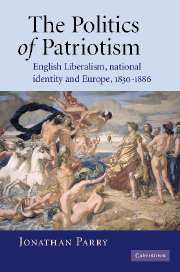Conclusion: Liberalism, state and nation
Published online by Cambridge University Press: 17 July 2009
Summary
Nineteenth-century political history is often written without any reference to the fact that most propertied Britons considered their country to be the greatest power that the world had ever seen and expected that status to be maintained. It is almost always written without reference to the widespread belief that Providence had given Britain its great position and required duties in return. And it is invariably written without enough reflection on the connection between Britain's global policy and the domestic dominance of the Liberal party between 1830 and 1886. This book has argued that for most of that period the Liberal party was successful at identifying with the values that seemed to have made Britain a uniquely successful polity and a major force in the progress of the world. Liberal leaders constructed a series of patriotic discourses around the themes of constitutionalism, tolerance, fiscal accountability, free trade and Christian humanitarianism. By studying the period 1830–86 as a whole, and by concentrating on how those discourses connected domestic, Irish and foreign themes, it is possible, on the one hand, to get a clearer sense of the nature and timing of British political shifts, and, on the other, to see that the most effective political language was one that was both liberal and nationalistic. By emphasising the pre-Gladstonian history of British Liberalism, a better picture emerges both of the character and success of the Liberal party, and of the prevailing political values of the nineteenth century, before the brief swing to imperialism of the 1880s and 1890s.
- Type
- Chapter
- Information
- The Politics of PatriotismEnglish Liberalism, National Identity and Europe, 1830–1886, pp. 387 - 399Publisher: Cambridge University PressPrint publication year: 2006



